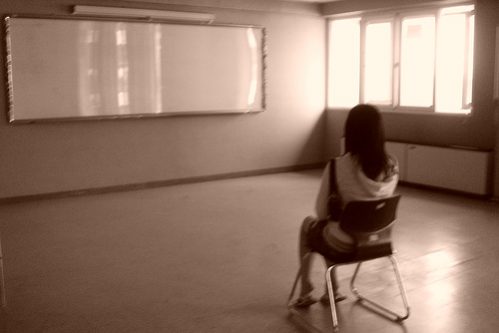by Kulsoom Sizar
10th Anniversary of 9/11 Series: I | II | III | IV | V | VI | VII | VIII | IX | X | XI | XII | XIII | XIV | XV |
You don’t just easily forget things like this. At the time, I lived in a nice neighborhood in Cleveland. I knew something was wrong on that devastating day on September 11, 2001 when my homeroom teacher told our class that something terrible had happened in the nation a few minutes ago. She didn’t tell us exactly what, so you can only imagine how all of us 7th graders went wild imagining all the possibilities of what could have been the problem. Although I knew something was off, I didn’t think too much of it being the blithe girl that I was.
It wasn’t until I got home from school, 7 hours later, that I found out the true nature of the problem. My parents told me about the catastrophe.
“C’mon, are you serious? The Twin Towers have collapsed? You have got to be kidding me.” I thought my parents were playing an awful joke on me. But to prove their point, they turned the television on, and there it was, on practically every channel, horrific images stared back at me, of the airplanes, the suffocating ashes in the city, people crying for their loved ones, and the collapsed ruins of the twin towers on what would soon be called Ground Zero.
The whole scene seemed so surreal and played out like a terrible movie. New York City – my hometown – had been attacked. All I could think about was the countless times I had passed by those two buildings when I lived there as a little girl and how I dreamt about going to the very top one day. The whole scenario left a really empty feeling in me.
What I didn’t know was that the following months would prove to be one of the hardest times of my adolescence. Living in a community that lacked much ethnic variation, I was one of the few people who stood out in my school because of my ethnicity. Before September 11, many people didn’t know what Islam was and would be genuinely interested and curious to ask me about my faith and my Pakistani heritage. After 9/11, I received a completely opposite response.
I lost a lot of friends and was at times ridiculed for being a Muslim and Pakistani. It was a period where I could filter out who my real friends were as they stayed true to their friendship through my time of adversity.
I would be asked ridiculous questions that I didn’t have answers to, such as the whereabouts of Osama or where the next terror attack would be. The media, a powerful outlet for mass communication, was showing Muslims in a negative light and those ideas were popularly growing amongst the American people.
As a young Muslim American I felt like I had something to prove after 9/11. I didn’t have a close-knit Muslim community that I could go to for support and our masjid was really far. I mainly turned to my family for help and support. Having only basic knowledge about my religion, I thrived to learn more about it and have answers for those who would ask me meaningless questions about my beliefs. I gained more Islamic spirituality and awareness and this brought me closer to my faith and allowed me to truly embrace being a Muslim.
For a while it felt like a complete internal struggle to keep calm through what I felt was discrimination by my peers and wanted to be alone and hide into the shadows. But after a few months, things slightly went back to normal in our school and I was once again hesitantly invited back into the social circles of the middle school life, safeguarded from the outside world where real discrimination was taking a toll on many Muslim Americans across the nation in various forms.
It’s been ten years since that mournful day where thousands of innocent people lost their lives and families grieved for their loved ones. These people came from all walks of life and belonged to a diverse set of ethnicities and faiths. It is important for us to remember this sorrowful day and the grieving effects it left on America and on the families who lost those close to their heart.
The last decade has proven to be a very difficult one for the Muslim people as well. They say that wounds fade with time, but even today Muslims are subjects of intense scrutiny and ridicule. When I was twelve, I couldn’t understand why the hostile acts of that day had anything to do with me being a Muslim.
Today, I think it’s important that as young Muslim Americans that we unite with the purpose of setting a better example to the world and overturn the negative images that many people have engraved into their minds about Islam. Our identity cannot be ridiculed and it’s our responsibility, especially as young Muslim Americans, to make an effort to show our faith in a more positive light.


I’m so sorry about your experience as a child. I went to a private Islamic school during that time so I didn’t have the same problems you did with your peers. Thank you for sharing your story.
Well said. Your article reminded me of when I was in 7th grade when the attacks happened. I went through a very similar experience. May Allah (SWT) grant us tawfiq and patience.
SubhanAllah unfortunately your experience is very similar to many other Muslim Americans in the state. JazakAllah khair for sharing, very well written!!!